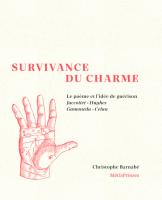Academic background
After studying cognitive psychology at the University of Barcelona and psychoanalysis at the Paris Diderot University, Christophe Barnabé earned a BSc in Psychology (2013). He also completed a BA in French Literature (2013) at the Sorbonne, where he later obtained his MA in French and Comparative Literature (2015). He then became an associate researcher at the University of Bern, where he taught, and completed a PhD in French and Comparative Literature (2020) funded by the Swiss National Science Foundation. He joined the University of Oxford in 2021, lecturing for a year at Somerville College before becoming Stipendiary Lecturer in French at New College and Merton College.
Research interests
His research focuses on 20th and 21st century literature in French, especially poetry, as well as modern and contemporary writing in Spanish and English from both sides of the Atlantic. He is particularly interested in the study of literary discourse as a means to dismantle traditional dichotomies opposing art and knowledge, magic and science, or rational and irrational modes of thinking.
His first book, Survivance du charme. Le poème et l’idée de guérison: Jaccottet, Hughes, Gamoneda, Celan (MētisPresses, 2024) studies four European poets whose work spans the second half of the 20th century. Their poetry collectively raises a compelling question: why do these authors, each in their own way, call on poetry’s ancient healing roots at a time when medical science has reached unprecedented efficiency? In search of a cure through language, caught between archaic verbal magic and modern rational thought, these poets’ quest reminds us of the dual meaning contained in the Latin word carmen: at once song and incantation, poem and charm.
Besides his work in the field of medical humanities, his other research interests include intermedial approaches to modern and contemporary literature, especially through painting and music. He contributed to the Jean Fautrier: matière et lumière exhibition catalogue (Musée d’Art Moderne de la Ville de Paris, 2018). Some of his more recent articles concern textual genesis and questions of poetic form, and are grounded in archival work on the manuscripts of contemporary French poets.
He is currently working on a project on ‘vicarious witnesses,’ examining how poets can offer testimony for events they haven’t directly witnessed – questioning, in the context of historical catastrophes, the assumed divide between direct and indirect forms of witnessing.
Teaching
Christophe Barnabé teaches French and Francophone literature from the nineteenth century onwards, translation into French, and literary theory. He also runs a French poetry creative writing workshop at the Maison Française.
Publications
Book
Survivance du charme. Le poème et l’idée de guérison: Jaccottet, Hughes, Gamoneda, Celan (Geneva: MētisPresses, 2024)

Articles and Chapters in Books
‘Les brisures souterraines de Jacques Dupin,’ Genesis, no. 58 (2024), pp. 25-36.
‘Magie,’ Dictionnaire du lyrique, ed. by Antonio Rodríguez (Paris: Classiques Garnier, 2024), pp. 209-211. (Available here.)
‘Sur le Nil. En longeant les carnets d'Esther Tellermann,’ L'Étrangère, no. 56 (2022), pp. 106-121.
‘Philippe Jaccottet lisant L’Été: comprendre un malaise,’ in Albert Camus et la poésie, ed. by Danièle Leclair and Alexis Lager (Rennes: Presses universitaires de Rennes, 2022), pp. 47-58.
‘Thierry Metz et le cas de L’homme qui penche (1997),’ Fabula/Les colloques: Littérature et écritures du cas (2021), online.
‘Mutam cinerem’ (on Anne Carson’s Nox), Critique, no. 879-880 (2020), pp. 658-669. (Available here.)
‘Du bruissement des organes à la musique des vers: la cénesthésie à l’œuvre dans “Les Nerfs” de Jules Supervielle,’ in La figure du poète-médecin, XXe-XXIe siècles, ed. by Alexandre Wenger et al. (Geneva: Georg, 2018), pp. 79-98.
‘La majesté de l’abrupt. Francis Ponge face aux peintures de Fautrier’ in Jean Fautrier, ed. by Dieter Schwarz (Düsseldorf: Richter Verlag, 2017), pp. 152-163. (French-German bilingual edition: ‘Die Majestät des Schroffen. Francis Ponge vor der Malerei Fautriers’, trans. Suzanne Schmidt.) Reprinted in the French-English edition as ‘Abrupt Majesty. Francis Ponge Face to Face with Fautrier’s Paintings,’ trans. C. Petridis, D. Wharry and B. Wooding, in Jean Fautrier. Matière et lumière (Paris: Paris Musées, 2018), pp. 178-189.
‘Les notes indiscrètes de Pablo Montoya,’ Europe, no. 1038 (2015), pp. 226-236.
‘Le lieu du perpétuel commencement: Mark Strand, Haydn, et les sept dernières paroles du Christ,’ Europe, no. 1026 (2014), pp. 291-304.
Translations
From English into French:
Jo Catling, ‘W.G. Sebald et la double peine du traducteur,’ in W.G. Sebald. Littérature et éthique documentaire, ed. by Muriel Pic and Jürgen Ritte (Paris: Presses Sorbonne Nouvelle, 2017), pp. 139-162.
‘Renaissance et maniérisme’ in Art. Les grandes œuvres tout simplement (Paris: Éditions Prisma, 2017), pp. 102-165.
Mark Strand, ‘Après les Sept Dernières Paroles,’ Europe, no. 1026 (2014), pp. 291-294.
From Spanish into French:
Pablo Montoya, Homme en ruines (Paris: Mémoire Vivante, 2017).
Pablo Montoya, ‘Mémoire de cimetières,’ Revue Siècle 21, no. 28 (2016), pp. 67-71.
Arnaldo Calveyra, selected unpublished poems, Place de la Sorbonne, no. 6 (2016), pp. 92-101.
Pablo Montoya, ‘Accord d’ombres,’ Europe, no. 1038 (2015), pp. 226-230.
From French into Spanish:
Daniel Maximin, ‘Silencio Comprendido,’ Káñina, Rev. Artes y Letras, Univ. de Costa Rica 42 (3), 2018, pp. 419-20.
Poetry & Prose
‘Tres figuras del encierro’ (Rosa Luxemburg, Hildegard von Bingen, Emily Dickinson), Abisinia Review, no. 10 (2022), online.
‘Iguazú,’ L’Étrangère, no. 55 (2021), pp. 48-59.
‘Amas,’ La Revue de Belles-Lettres, nos. 1-2 (2020), pp. 225-234.
‘Dimanche des Rameaux’ in Simple trace, anthology (Paris: Éditions Sillage, 2016).
‘Enfin cela m’est donné…,’ Thauma, no. 14 (2016).
‘Mãepai’ and ‘A luz de teus olhos…,’ poems translated into Portuguese, Usina, no. 27 (2016).
Selection of poems in Sanctuaire d’encre, anthology (Paris: Éditions Sillage, 2014).